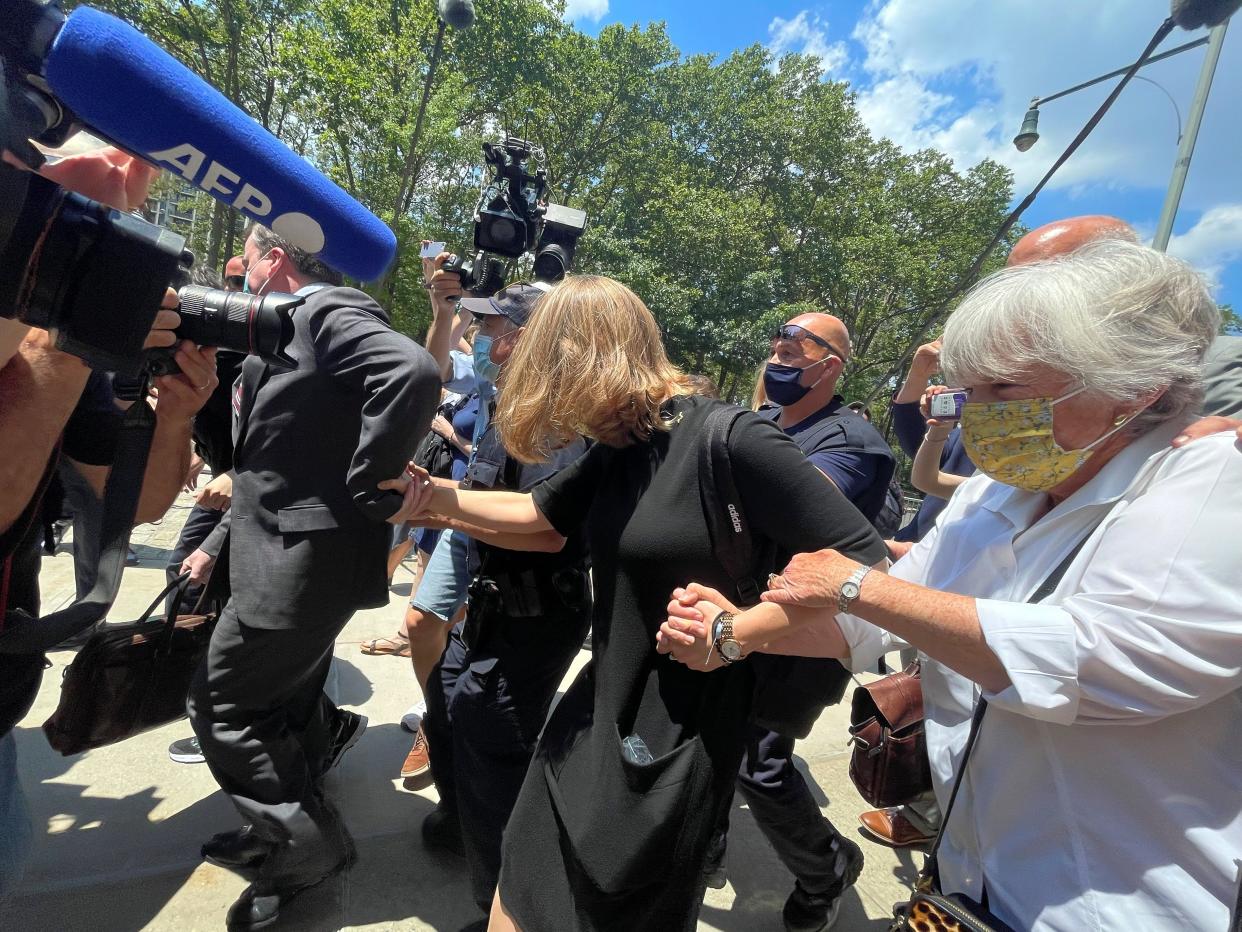Allison Mack got a surprisingly short sentence for her NXIVM sex cult crimes. Here’s why

Allison Mack has been sentenced to three years in prison for her involvement in NXIVM, the sex cult once run by Keith Raniere. The sentencing hearing took place on Wednesday in Brooklyn, three years after Mack and Raniere’s respective arrests.
Mack left as she arrived: head bowed, concealing her face from cameras by way of her blonde hair and, at times, her raised arm. Inside the courtroom and before US District Judge Nicholas Garaufis announced her sentence, Mack apologized – as she has done before – to the victims of her actions.
“From the deepest part of my heart and soul, I am sorry,” she said, also stating that she was filled with “remorse and guilt” and that she has “made choices [she] will forever regret”.
Garaufis said he deemed her apology sincere, but that Mack – a former actor on Smallville – should nonetheless receive a serious sentence for her role as a “willing and proactive ally” and “essential accomplice to Raniere’s monstrous crimes”.
Three years is a light sentence for Mack. She pleaded guilty to charges of racketeering and racketeering conspiracy, which carry a federal maximum of 20 years in prison each. Federal sentencing guidelines meant that going into Wednesday’s hearing, she could have faced anywhere from 14 to 17 and a half years behind bars. Weighed against these numbers — and against Raniere’s 120 years — three years is a lenient sentence.
Some may be outraged by this outcome. (The words “shockingly lenient” have been uttered on social media.) Others will view it as the result of a combination of mitigating factors.
Garaufis gave three reasons for his relative leniency. In a sentencing memo, he underlined that Mack was – like her own victims – “ensnared in Mr Raniere’s coercive and manipulative web”. He highlighted her “remorse and contrition”, as well as her “significant progress towards rehabilitating [herself]”. Crucially, he mentioned her decision to cooperate with authorities against Raniere, providing evidence and “key details about Mr Raniere’s role in DOS [a secret organisation within NXIVM in which some women were recruited as “slaves” to “masters”], including his solicitation of nude photographs and sexual encounters”.
Reflecting on Mack’s sentence is an interesting exercise, in that it forces us to reckon with how we think about victims and perpetrators. We want justice for victims. The US criminal justice system, for better or (often) for worse tends to mete out that justice in the form of prison years and avalanches of charges. It’s a terribly flawed system, but it’s the one we have. When Harvey Weinstein was sentenced to 23 years in prison, it felt like history, because it was: that sentence was an acknowledgment of the suffering experienced by his victims. It meant that the people he had wronged mattered. It meant that their pain mattered.
We like to think of victims and perpetrators as two wholly separate entities, but sometimes, that’s impossible. Mack’s history within NXIVM doesn’t fit squarely in a box. She’s both a victim and a perpetrator. She hurt others, undeniably, by her own admission, and that can never be reversed. She was also, as acknowledged by Garaufis, a victim of a manipulative, toxic man. She was a cult member and a cult recruiter.
Ever since Mack’s arrest, and as the NXIVM story played out in news stories and documentaries, I have wrestled with her narrative. What she did to other women inside the organization was abusive and cruel. The suffering she brought on to others is undeniable. I don’t know if those wrongs can ever be fully righted.
At the same time – and this isn’t a “but” or a “then again”, but quite literally “at the same time as these things were happening” — Mack was herself being manipulated by Raniere, now a convicted fraudster and sex trafficker. There is a scene in The Vow, HBO’s documentary about NXIVM, that I can’t stop thinking about. It’s a clip of Mack’s first meeting with Raniere in 2006, on the sidelines of a volleyball game. He and Mack sit down for what is, on the surface, a pretty innocent conversation about the meaning of art. But within minutes, Mack is crying, clearly wracked with personal doubts. “Do you hug?” Raniere asks her as the meeting comes to an end. Mack does him one better: “I hug and I kiss,” she tells him. And just like that, she’s pulling him into a tight embrace and giving him a peck on the lips.
I have watched that scene more times than I care to admit. Every time, I’ve been baffled by how quickly, and how swiftly, Raniere got Mack to let her guard down. How he got under her skin. How he convinced her, just like that, that he knew the secrets of the universe.
Of course, this doesn’t excuse anything Mack did. She hasn’t been excused. She has been sentenced. She is going to prison. But I remain utterly unconvinced that she would ever have committed the acts she committed without Raniere. That is reflected in today’s sentencing, and I don’t think that’s a bad thing.
Too many defendants won’t be granted the same leniency as Mack has been granted. I can’t ignore the fact that she’s a young, wealthy white woman with a high-profile case and, it seems, a competent legal team. Too many will instead fall through the cracks of a cruelly bureaucratic system, possibly for lesser charges.
I don’t hope for heavier sentences for the Allison Macks of the world. I hope for lighter sentences for all those complicated cases who deserve them too.
Read More
Why it’s surprisingly important to report on ‘viral’ content

 Yahoo News
Yahoo News 
